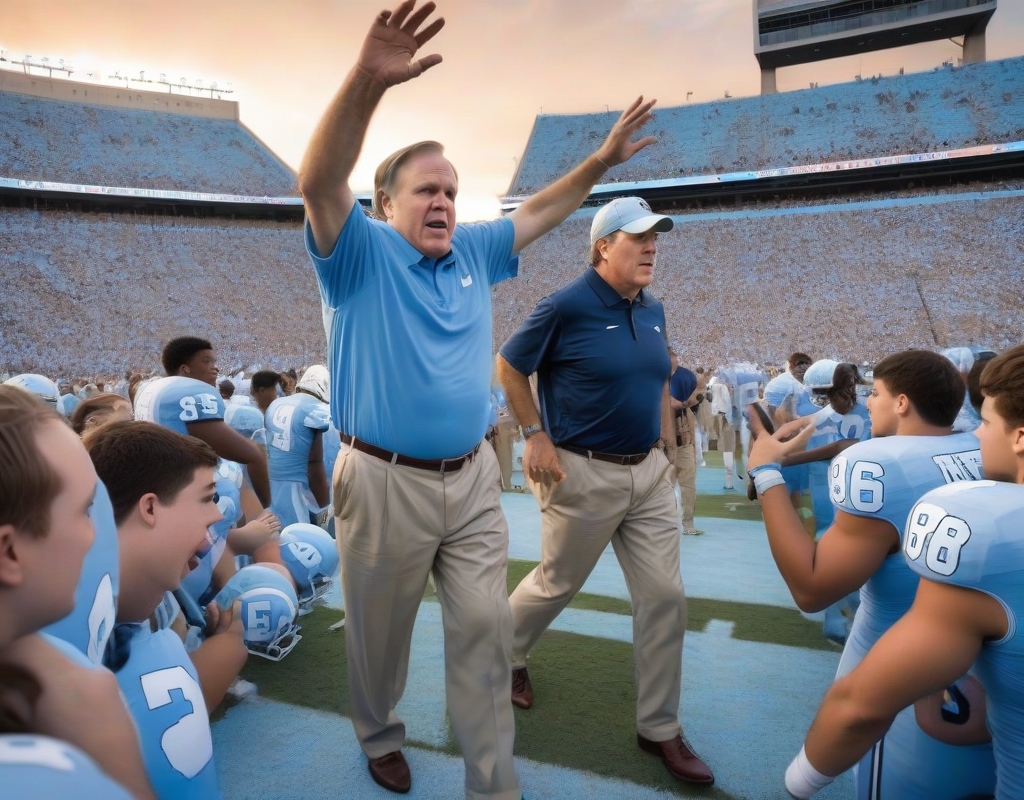In a surprising twist that has sent shockwaves through the sports world, Bill Belichick, the acclaimed former head coach of the New England Patriots, is set to take over as head coach for the University of North Carolina (UNC) Tar Heels. Renowned for his leadership that brought six Super Bowl titles to the Patriots, Belichick is now tasked with helming a college football team, a role he has never before undertaken in his storied career. At 72, his venture into NCAA football marks a distinct new phase, putting his profound knowledge and unique strategies to test in the collegiate arena.
Belichick’s tenure with the Patriots has become a benchmark of success in the NFL. With a commanding win-loss record and multiple championships under his belt, his coaching prowess is well-documented. His distinct approach, emphasizing precision and maximizing player potential, has made him a legendary figure in professional football.
However, transitioning to college football presents a unique set of challenges and opportunities for Belichick. His leap into college coaching came after a brief hiatus from the NFL, underscoring his relentless passion for the sport. Belichick’s strategy in embracing this new challenge is to leverage his deep-rooted understanding of football dynamics to elevate UNC’s program to new heights. This transition to NCAA football from the professional ranks will test his adaptability, especially in navigating the complexities of recruiting and player development in the college sphere.
Belichick’s arrival is poised to significantly boost the ACC’s profile. The anticipation of his coaching in college football is expected to draw increased media exposure and elevate the competitive landscape of the conference. UNC aims to harness his leadership to transform their football program and enhance their stature in collegiate sports. Financial terms of Belichick’s contract reflect a substantial investment, with reports suggesting he will earn around $10 million a year, highlighting UNC’s commitment to reshaping its football landscape.
This historic move has been met with enthusiasm by the UNC community. Chancellor Lee H. Roberts and Athletic Director Bubba Cunningham have both expressed their excitement and confidence in Belichick’s capabilities to bring about a transformative era for Tar Heel football. The inclusion of a succession plan involving Belichick’s son, Stephen, in the contract also points to a long-term vision for continuity within the program.
As Belichick takes on this new role, comparisons to past transitions of NFL coaches to college ranks surface. Notable examples include Pete Carroll and Nick Saban, who successfully adapted their extensive NFL experiences to college football, each creating dynastic runs at their respective institutions. These historical precedents provide a backdrop for what could be expected from Belichick’s tenure at UNC.
Sports analysts and commentators have been vocal about this unexpected career move. ESPN’s Kirk Herbstreit remarked on Belichick’s proven tactical brilliance, pondering how his innovative approach will translate to the college game. Meanwhile, Michael Irvin from NFL Network considers the potential shifts in recruiting strategies that Belichick might introduce, potentially setting new trends in how college football programs manage and scout talent.
Belichick’s transition also introduces broader discussions about the evolution of college football coaching. His entry into the NCAA marks a significant moment, potentially influencing coaching strategies and the overall approach to managing college teams. The expectation is that his impact will extend beyond just wins and losses, possibly shaping policy and strategic decisions across collegiate sports programs.
In conclusion, Bill Belichick’s move to UNC heralds a period of significant change and high expectations. His extensive experience and strategic mind are assets that UNC hopes will translate into substantial success on the college football stage. As Belichick prepares to translate his legendary NFL career into a collegiate context, all eyes will be on Chapel Hill to see how one of football’s most brilliant minds adapts to the rhythms and challenges of NCAA football. This new chapter not only represents a personal shift for Belichick but also a crucial evolving phase in college football dynamics.




